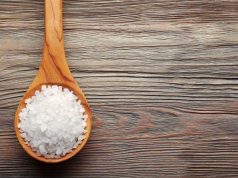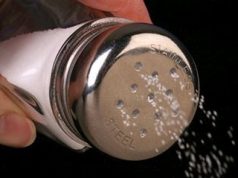An easy way for patients to reduce nighttime urination and subsequent impact on sleep
MONDAY, March 27, 2017 (HealthDay News) — Lowering salt intake could lead to fewer episodes of nocturia, according to a study presented at the annual meeting of the European Association of Urology, held from March 24 to 28 in London.
Matsuo Tomohiro, M.D., of Nagasaki University in Japan, and colleagues collected data on 321 Japanese adults. All of the participants had high salt intake and sleeping problems. They were given instructions and help to reduce their salt intake and followed for 12 weeks. The American Heart Association recommends that people consume no more than 2,300 milligrams of sodium daily.
The researchers found that 233 individuals in the study reduced their salt intake. They went from an average of 11 g to 8 g per day. With that reduction in salt, the average frequency of nighttime urination fell from 2.3 to 1.4 times per night. The number of times people needed to urinate during the day also decreased. In comparison, the 98 participants whose average salt intake rose — from 9.6 g to 11 g — had an increase in frequency of nighttime urination, from 2.3 to 2.7 times a night.
“This is an important aspect of how patients potentially can help themselves to reduce the impact of frequent urination. Research generally focuses on reducing the amount of water a patient drinks, and the salt intake is generally not considered,” Marcus Drake, B.M., B.Ch., a professor at the University of Bristol in the United Kingdom, and leader of the working group for the ESU Guidelines Office Initiative on Nocturia, said in a news release from the European Association of Urology. “Here we have a useful study showing how we need to consider all influences to get the best chance of improving the symptom.”
Press Release
More Information
Copyright © 2017 HealthDay. All rights reserved.








